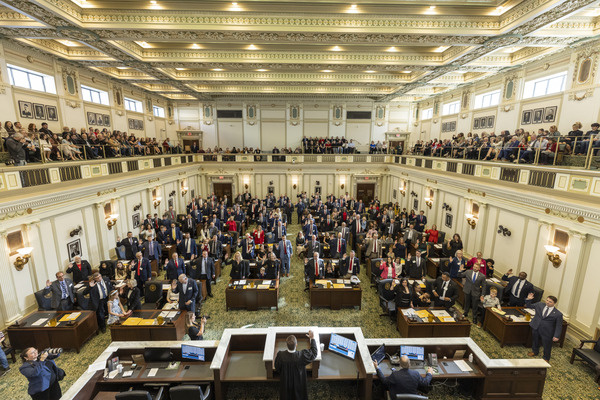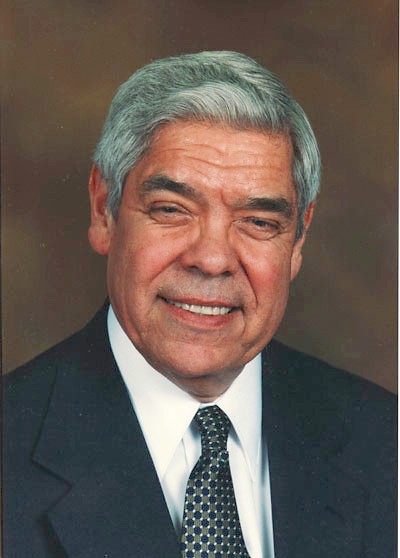Pictured: Dewey Bartlett
Oklahoma History Lesson - Dewey Bartlett
By Steve Byas
After the Democrats lost, for the first time in state history, a governor’s race in 1962, they figured it was just an aberration. However, in 1966, the Republicans won again, this time with state Senator Dewey F. Bartlett, by an even larger margin of 82,000 votes.Bartlett’s election was a sea change in Oklahoma politics. Not only was Bartlett a Republican, he was also a Roman Catholic. Only six years earlier, the fact that Senator John Kennedy of Massachusetts was a Catholic no doubt played a role in his defeat in Oklahoma to Republican Richard Nixon. By 1966, however, Bartlett’s religion was essentially a non-factor in the race.
Bartlett was born in Ohio, educated at Princeton (where he played on the basketball team), and educated as a geological engineer. After serving as a Marine combat pilot in World War II, he launched a career in the oil industry. His father had started the Keener Oil Company, investing in oil fields in Oklahoma. The younger Bartlett also purchased a ranch in Wagoner County. In addition to making money as an oil man, Bartlett served on the boards of the Salvation Army, the Veterans of Foreign Wars, the Cattleman’s Association, and the Urban League.
While recovering from hepatitis, Bartlett read books on history and politics, spurring him to get involved in politics. After being elected to the Oklahoma State Senate, where he was among only a handful of Republicans, he took a strong interest in the Oklahoma economy. Believing that many students were graduating from high schools in Oklahoma with no real marketable skills, he pushed for a bill to establish vocational-technical education in the public schools. In 1966, Senator Bartlett defeated Happy Camp for the Republican nomination for governor, and then the Democratic Party nominee, Preston Moore.
As governor, he quickly angered the Oklahoma Education Association (OEA) when his proposed $1,000 per year pay increase for teachers was dismissed as not enough. (It never is enough). They also did not like his veto of a bill that would have created a public kindergarten system for Oklahoma. But his enthusiasm for vo-tech education was a huge factor in the creation of the system we now have in the state.
Bartlett also was opposed throughout his term of office by the lieutenant governor, George Nigh, a Democrat. The two proved unable to work well together. However, when Bartlett died, Nigh spoke at his Capitol memorial service, and declared that all Oklahomans owe a huge debt of gratitude to Bartlett, because of the work he did in bringing several businesses – and jobs – to the state. Bartlett spent $17,000 of his own money for travel to lure businesses to locate in Oklahoma. Among the businesses were a Hertz reservation center in Oklahoma City; a credit card system for Sun Oil in Tulsa; National Zinc in Bartlesville; Armco Steel in Sand Springs; Uni Royal in Ardmore; Weyerhaeuser in Broken Bow; Dayton Tire in Oklahoma City; Dalton Foundries in Cushing; St. Joe Paper in Sapulpa; and Swan Rubber in Stillwater. He used the state’s vo-tech system – which he had basically created – as a major selling point in his recruitment efforts.
Part of his strategy was increasing pride in the state, and he attempted to change the “dumb Okie” image left over from the Dust Bowl years. He said OKIE meant Oklahoma Key to Intelligence and Enterprise (or Oklahoma Key to Industry and Education), and had thousands of “Okie” buttons made, which he personally handed out to state employees and other Oklahomans.
Because of a constitutional amendment, Bartlett had the opportunity to run for reelection in 1970. He would have been the first to get reelected, had he won, but the campaign ran into some problems. First of all, a Republican was in the White House, and that usually gives a boost to the party out of power in the mid-terms. Secondly, the American Party candidate, Ruell Little, got 25,000 votes, probably pulling most of those from Bartlett. His campaign manager then angered some rural Oklahomans when he said the campaign was doing well in the metropolitan areas, and it was now time to “get out in the sticks.”
In the end, Bartlett was defeated by a mere 2,190 votes, the closest election in state history.
In 1972, though, Bartlett won by almost 40,000 votes in a race for the United States Senate. During his time in D.C., Senator Bartlett crafted a very conservative voting record, favoring the construction of the B-1 Bomber plan, and opposing President Jimmy Carter’s scheme to give away the Panama Canal. Unfortunately, Bartlett only served one term, as the lung cancer that would take his life (he was a chain smoker), made a campaign in 1978 impossible. He died early the next year.
As Governor George Nigh said at Bartlett’s funeral in 1979, “His name is synonymous with the growth of our state, and we all have a better life because of him.” He added that when succeeding governors opened new plants and factories, they were simply “picking the blooms from the seeds sown by Dewey Bartlett.”
Bartlett is buried at Calvary Cemetery in Tulsa.
Steve Byas teaches Oklahoma History at Randall University in Moore.










Latest Commentary
Sunday 2nd of February 2025
Sunday 2nd of February 2025
Sunday 2nd of February 2025
Sunday 2nd of February 2025
Sunday 2nd of February 2025
Sunday 2nd of February 2025
Sunday 2nd of February 2025
Sunday 2nd of February 2025
Sunday 2nd of February 2025
Sunday 2nd of February 2025
Sunday 2nd of February 2025
Sunday 2nd of February 2025